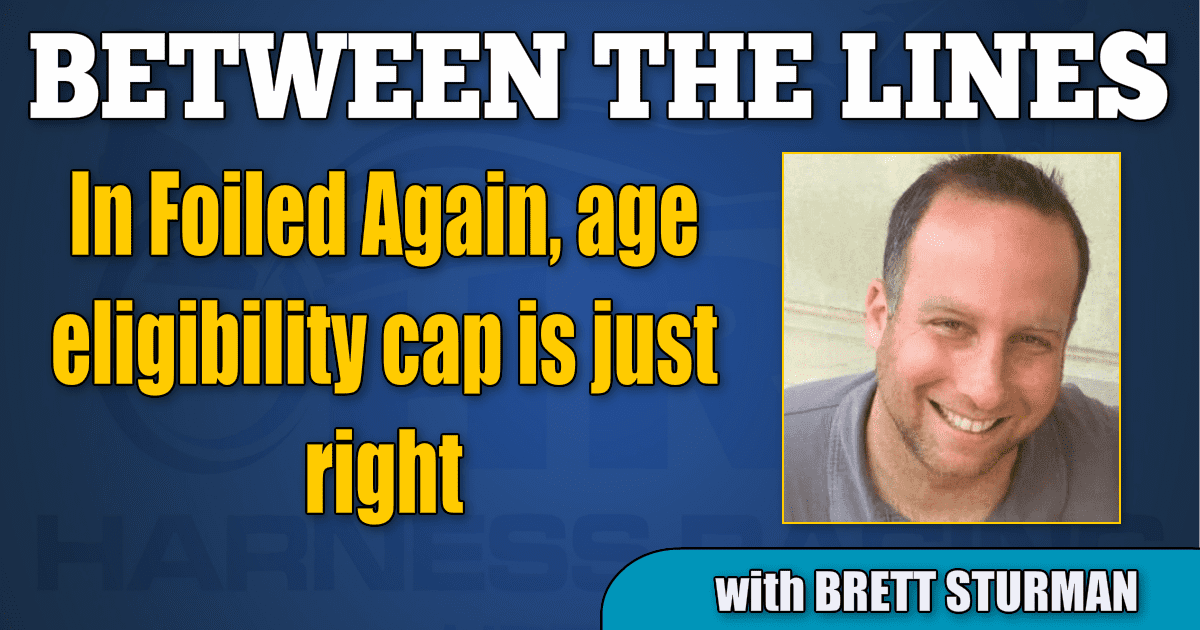In Foiled Again, age eligibility cap is just right
by Brett Sturman
United States Trotting Association (USTA) rules state that no horse that is 15 years of age or older is eligible to perform in any race except matinees, county fair races, or races exclusively for amateur or club drivers as sanctioned by USTA. The Alcohol and Gaming Commission of Ontario (AGCO) rules state the same thing, although British Columbia in western Canada does allow horses to race at 15.
In less than two months, it will be mandated that the career of Foiled Again come to an end. The richest horse of all time with earnings of over $7.6 million and 105 wins through 325 starts will no longer race, even though to this moment he remains extremely competitive and capable. It raises the question: should there be a rule that says horses can’t race past age 14?
Ron Burke has trained Foiled Again for the last 10 years, and his answer to that question might surprise you. “If I didn’t have to retire him at 14, I would have retired him earlier,” said Burke. “Fourteen became a goal and it was something to work towards.”
He references a downturn for Foiled Again early in this year, “When we had that bit of a swoon, it would have been easier just to quit. But I had the goal to get him to 14 and already had it in my mind of the farewell tour so I knew it was something to work to. The plan was to give him a break, get him back sharp and then know when that happened that it would kick off the farewell tour. And that was why it worked. Without the rule to retire him, at the point he went bad there I would have retired him.”
In addition to Burke, co-owner Mark Weaver echoes those sentiments and has no issue with Foiled Again not being able to race past this year. Weaver says, ”I think 14 years is plenty, and I have no problem with it. It’s kind of nice because – especially with us – Foiled Again has had this farewell tour and if we didn’t have this deadline then it wouldn’t have prompted all of this to happen.”
Foiled Again notwithstanding, eventual sure-fire Hall of Fame trainer Ron Burke believes that there should be a limit and that there’s nothing wrong with 14. Burke says, “For me I think 14 is a good number. At some point, you need – not everybody is going to always do what’s best for their horse – and you can’t just leave it open ended and then have horses out there that shouldn’t be there. Maybe it should be 14, maybe it should be 12, but then again, I see too many horses at 12 that are still very usable. So, 14 is the number we’ve gotten used to and I think it’s a fair number.”
But what about those that feel the opposite? There is a case that could be made where if a 15-year-old is relatively sound and fit, that they be able to continue racing. Foiled Again paced his most recent mile last week at Hoosier Park in a time of 1:51.4 when he was second by less than a length. If this were any other 14-year-old and in the hands of a conditioner with perhaps a different mindset than Burke, there wouldn’t be any real reason for a horse of that profile to not keep racing.
It would be a hard to say a 15-year-old pacing in 1:55 can’t race, but a 13-year-old pacing in 2:00 can. After all, isn’t that what qualifying time standards exist for? You could even make the standards uniquely more difficult for a 15-year-old like they did to Cuba Gooding Jr. in Men of Honor and if the horses can prove it, why not let them race.
With that being said, history shows that successful 14-year-olds are far more the exception than the rule. For every Foiled Again or even less heralded veterans Saint William A or Grecale AS who closed out very respectable 14-year-old seasons in 2017 last year, there are far more countless others who just hang around.
Some are aging horses that are jammed into low level claiming races each week knowing that they won’t ever be claimed with an impending expiration date. Others are low level conditioned horses that were once exceptionally good over 10 years ago are now just finishing out their racing days complete shells of what they once were, and it’s sad.
Even though there will be some horses that could continue to compete into age 15 and maybe even later than that, there will be far more that can’t but try to do so anyway. That’s the problem that the rule seems to exist to prevent, and to that end there does come a time when enough is enough.
If there was ever a horse that earned the right to keep racing until his performances on the track suggest otherwise it is Foiled Again. But if his connections of all people feel that it’s already been a long enough time and that even without the forced retirement that he would be retired anyway, it shows that the rule in place is the correct one.

















